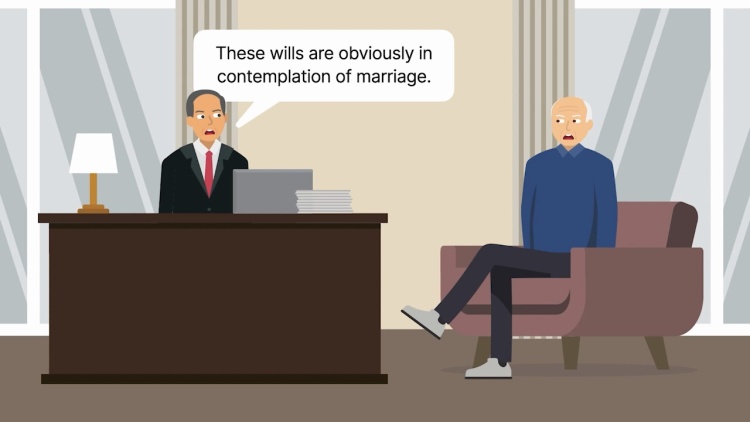Erickson v. Erickson
Connecticut Supreme Court
246 Conn. 359, 716 A.2d 92 (1998)

- Written by Christine Raino, JD
Facts
Ronald K. Erickson, a widower and father of three daughters, Laura Erickson Kusy, Ellen Erickson Cates and Alicia Erickson (plaintiffs), married Dorothy Mehring, who became Dorothy Erickson (defendant). Two days before their wedding, Ronald and Dorothy executed mirror wills because they planned to travel overseas on the Concorde after their wedding. Ronald executed a will leaving all of his estate to Dorothy as the surviving spouse, or if she predeceased him, fifty percent to his children and fifty percent to Dorothy’s children. Ronald’s will also made Dorothy executrix of his estate and designated her as guardian to any of his children who were not yet eighteen years old. A state statute in effect at the time provided that a will executed prior to marriage would be automatically revoked once the testator married if the will did not provide for the contingency of marriage. The attorney who drafted Ronald and Dorothy’s wills did not believe that a written provision in the wills specifically providing for the contingency of marriage was necessary because the fact that Ronald’s will left everything to Dorothy and that the wills were executed so close in time to the wedding clearly indicated Ronald did this in anticipation of the wedding. The attorney also met with Ronald before he died and Ronald confirmed that his estate would pass to Dorothy. After Ronald’s death, his will was admitted to probate by the Probate Court for the District of Madison. Alicia Erickson appealed the probate court’s decision to the trial court, and filed a motion in limine to exclude all evidence except three documents – the will, the marriage certificate and Ronald’s death certificate – in light of which she asserted the state statute automatically revoked the will. The trial court excluded the evidence but affirmed the probate court’s judgment admitting the will to probate because it provided for the contingency of marriage. Alicia Erickson appealed to the Supreme Court of Connecticut.
Rule of Law
Issue
Holding and Reasoning (Borden, J.)
What to do next…
Here's why 907,000 law students have relied on our case briefs:
- Written by law professors and practitioners, not other law students. 47,100 briefs, keyed to 996 casebooks. Top-notch customer support.
- The right amount of information, includes the facts, issues, rule of law, holding and reasoning, and any concurrences and dissents.
- Access in your classes, works on your mobile and tablet. Massive library of related video lessons and high quality multiple-choice questions.
- Easy to use, uniform format for every case brief. Written in plain English, not in legalese. Our briefs summarize and simplify; they don’t just repeat the court’s language.





